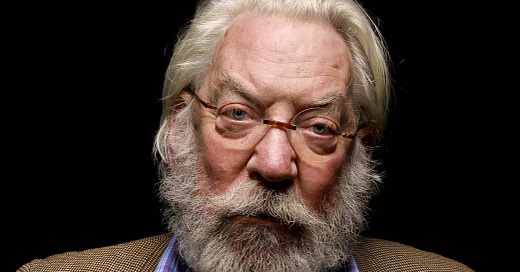
Body Type brings you insights, essays, and guidance about body image and body culture from me, an independent journalist who has been through big body changes and worked inside the wild world of the fitness industry. No ads, no sponsors, and right now, no paywall. Please support my work by subscribing:
Actor Donald Sutherland died yesterday, and retrospectives of his inimitable career can be found all over the internet. Along with those, I came across a video from 2017 that reduced me to a puddle at 4:22:
After being teased in school for his looks and called “Dumbo” by his classmates, Donald asked his mother if he was good looking, to which she cagily replied that his face had “character.” This caused him to hide in his bedroom for a day and carry around his hurt for the next 65 years.
I’ve seen some related chatter about Donald’s looks, comments about how, “No, he’s so hot, actually!” That’s not the conversation that matters. What matters is that men are negatively affected by a looks-obsessed culture just like the rest of us. While women in particular are unquestionably held to higher standards and norms around beauty and have historically suffered more under them, you can’t look at the pain in Donald Sutherland’s eyes and tell me that men in general are necessarily less bothered by being deemed unattractive.
But we act as though this is the case. Only a society that cares so little for how its words about men’s looks affect them could produce this New York Times piece, a sprawling feature about the phenomenon of the “rodent man” — guys who look like rats (???) who are somehow still hot, or something — that asks:
“Rodent Men”: What are they? Tiny men? Men who eat garbage? Some kind of furry science experiment gone wrong?
These men look like weird, creepy freaks you might imagine eating out of a trash can, the Times suggests. They’re hot, we think, but my god we don’t know WHY. The highest of compliments, that one’s appeal is completely fucking baffling to the beholder! Imagine if a prestigious news publication published a breathless missive about the celebrity women with faces like horses or birds1 or, I don’t know, some kind of reptile, but wait — that’s sexy right now, for reasons! Please. It wouldn’t be done, just as this rodent men thing should not have been.
A few months ago there was some discussion over the idea of “medium-ugly” men going around online, and only a few days ago a corner of Twitter was yapping about how “normalized” it is for hot girls to date “ugly men.” When it comes to men, people bat around the word ugly as if it’s a cheeky, fluffy little term and not one that’s insulting and outright mean. Calling someone ugly is mean; this is kindergarten stuff. I have to believe people think it’s OK because they think men just don’t care or don’t suffer body image slings and arrows like women do, so it feels like punching up, which is also how I believe they feel about dick jokes:
As Donald Sutherland makes plain, though, some men do indeed internalize deep pain about not measuring up to a certain ideal. How is that a surprise when all of us, not only women, are walking around just wanting to be loved in a world that so often reserves its love for only the most beautiful?
Even if you don’t care about men’s feelings and body image issues for some reason, this affects you, too: That casual cruelty about men’s looks is allowable — turned into jokes and trend pieces and podcast fodder — directly contributes to a culture in which everyone’s looks are constantly scrutinized and insulted. If you’re in the habit of dunking on the appearance of any men who don’t look like your definition of perfection, and talk loudly and proudly about how much being hot matters above all, why would you think those attitudes won’t continue to apply to you?
If you’re nasty about what people look like, how can you not see that you maintain the same status quo that’s almost certainly also hurt you, driven you into your bedroom in despair, and weighed you down with shame for decades?
Recall that Sarah Jessica Parker was often described as “horse-faced” at the height of Sex and the City, and that the gang from It’s Always Sunny in Philadelphia routinely dunked on Dee Reynolds for looking like a bird.






"Your face has character," from a mother, is gut wrenching!
For me this falls under the category of not commenting on someone else’s body. Even people largely considered to be “terrible” (I realize this can be incredibly variable.) I’m referring to the many times people have made nasty comments about Elon musks body or donald trumps body. I dislike both of them. They are terrible humans, in my opinion. But I won’t negatively comment on their bodies because that shouldn’t be how we criticize people.